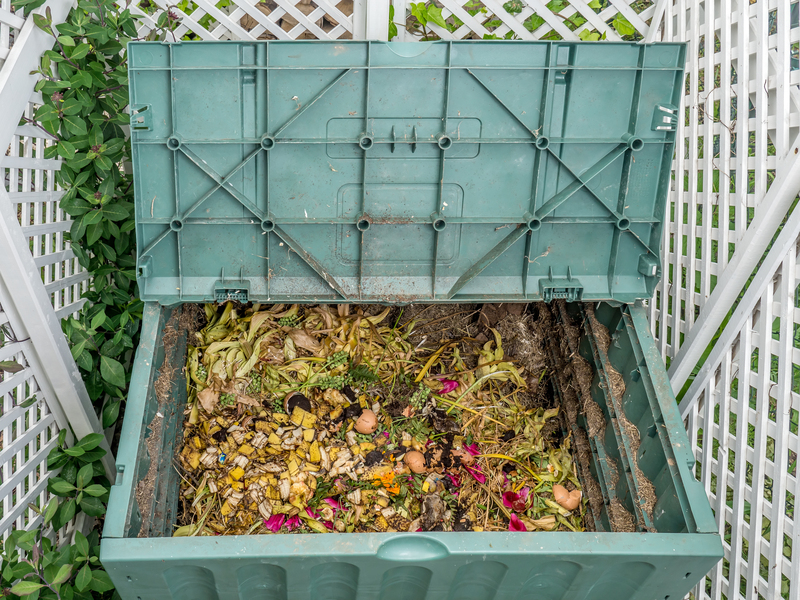Sustainable Solutions for Getting Rid of Old Pots and Pans
When it comes to decluttering the kitchen, many people wonder what to do with that stack of old pots and pans collecting dust in the cupboard. Simply throwing them away can be wasteful and environmentally unfriendly. Fortunately, there are a variety of sustainable options for disposing of cookware that can help reduce your carbon footprint and possibly even benefit others. This comprehensive guide will explore several eco-conscious methods to dispose of old pots and pans in a way that supports sustainability and reduces landfill waste.

Why Sustainable Disposal of Cookware Matters
Every year, millions of old cookware items end up in landfills. These materials often do not decompose and can leach harmful chemicals or metals into the environment. By pursuing sustainable solutions for getting rid of pots and pans, you not only free up space in your kitchen, but also contribute to protecting our planet.
- Reduces landfill waste
- Minimizes environmental pollution
- Promotes recycling and upcycling
- Benefits local communities through donations
Assess the Condition of Your Old Pots and Pans
Before deciding on a disposal method, evaluate the state of your cookware. Ask yourself:
- Are the pots and pans still usable? Slightly worn or stained items may still function for basic cooking tasks.
- Is there any significant damage? Cracked, rusted, or broken handles may make items unsafe for further use.
- Is the cookware non-stick? Non-stick coatings require special attention due to potential environmental hazards.
By assessing condition, you can better determine whether reuse, recycling, or repurposing is the best sustainable disposal method.
Creative Ways to Reuse Old Pots and Pans
1. Upcycle as Planters or Garden Containers
Turn your worn-out cookware into unique garden planters. Old pots and pans make excellent homes for herbs, flowers, or succulents. Simply drill a few holes in the bottom for drainage, add soil, and plant your favorite greenery.
- Tip: Paint or decorate the exterior for a personalized touch to your garden decor.
2. Use in DIY Home Projects
Get creative by turning old pans into decorative or practical home objects. Consider the following ideas:
- Wall Decor: Hang unique vintage pans as kitchen art.
- Storage Solutions: Use deep pots to organize tools, utensils, or craft materials.
- Bird Feeders: Attach pans to sturdy posts and fill with birdseed for the backyard.
3. Donate to Community Groups or Schools
If your old cookware is still functional, consider donating it to local charities, shelters, or after-school programs. Many community kitchens and non-profit organizations are in consistent need of kitchen supplies. Your donation can provide a much-needed resource and extends the life of your old pots and pans.
How to Recycle Old Pots and Pans Responsibly
Recycling is one of the most sustainable solutions for old cookwares, especially for metal pots and pans. However, recycling processes can vary based on material and local regulations.
1. Know Your Materials
Most pots and pans are made from materials such as:
- Stainless steel
- Aluminum
- Copper
- Cast iron
- Non-stick coated metals
*Metal pots and pans are generally recyclable*, but non-stick coatings or handles made from plastic or wood can complicate recycling.
2. Check with Local Recycling Centers
Contact your local scrap metal or recycling center to find out if they accept cookware and under what conditions. Some centers may require you to remove non-metal parts (e.g., handles, lids) before accepting the items for recycling.
- Some cities have specific drop-off points or curbside pickups for metal goods.
- Larger cities may have specialized facilities for non-stick or Teflon-coated pans.
3. Specialty Cookware Recycling Programs
Brands such as TerraCycle and some cookware manufacturers offer take-back programs to recycle old pots and pans. Always check the manufacturer's website for programs in your region.
- Mail-back options: Some companies provide shipping labels for easy returns.
- Retail drop-off: Certain stores, especially those selling kitchen goods, have recycling bins for old cookware.
Disposing of Non-Stick and Teflon-Coated Pans
*Non-stick pans pose unique challenges for sustainable disposal.* The Teflon or PTFE coatings are not easily recycled and can release harmful chemicals if incinerated. However, you can still follow eco-friendly steps when disposing of them.
- Check with Manufacturer: Some brands offer special recycling initiatives for non-stick pans.
- Contact Local Waste Management: Ask your municipal waste facility for guidance on Teflon-coated item disposal.
- Remove Handles: Detach any plastic or wood and recycle metal portions where allowed.
Never burn non-stick pans or discard them carelessly. Proper disposal prevents harmful chemical release into the environment.
Alternative Sustainable Solutions
1. Repurpose for Camping or Outdoor Cooking
Older pots and pans, while no longer ideal for the kitchen, might still serve a purpose in the great outdoors. Consider saving them for camping trips, potlucks, or outdoor barbecues where wear and tear is less of a concern.
2. Host a Neighborhood Swap or Freecycle Event
Organize a local swap event or use online platforms like Freecycle to give away your old cookware to someone in need. What may be useless to you could be a treasure for someone starting their own kitchen.
3. Upcycle into Art or Functional Objects
- Create clocks, mirrors, or mosaics using the pans as bases.
- Offer old pots and pans to local artists, schools, or makerspaces.
- Use them in theater productions as props or stage decorations.
What Not To Do With Old Cookware
While it can be tempting to throw old pans straight into the garbage, this is the least sustainable solution, especially for metal and coated materials. Here are things to avoid:
- Do not place metal cookware in household recycling bins unless specifically accepted.
- Never incinerate non-stick or coated pans.
- Avoid illegal dumping, which harms the environment and may lead to fines.
The Life Cycle of Cookware: Buy Smart, Dispose Smarter
As you consider sustainable disposal of pots and pans, it's also wise to consider your future purchases. Choosing durable, eco-friendly cookware can help reduce waste over time.
- Opt for cast iron, stainless steel, or 100% recycled aluminum pots and pans.
- Avoid cheap, disposable cookware that quickly ends up in the landfill.
- Invest in brands with take-back or recycling initiatives.
Caring for Your Cookware
Proper care extends the lifespan of your pots and pans, minimizing the frequency of disposal. Follow manufacturer instructions for cleaning and storage, and avoid excessive heat or harsh chemicals that can damage coatings.
Eco-Friendly Brands and Programs
Some cookware brands are taking the lead by offering eco-friendly recycling and trade-in programs. Notable companies include:
- Le Creuset: Offers guidance for recycling cast iron and enamel cookware.
- GreenPan: Features sustainable manufacturing and recycling initiatives.
- TerraCycle: Partners with numerous brands to recycle otherwise hard-to-dispose items.

Frequently Asked Questions
Can all pots and pans be recycled?
Most metal pots and pans are recyclable, but non-stick or composite materials may not be accepted by all facilities. Always check with your local recycling provider to confirm rules for cookware recycling.
Is it safe to donate old non-stick pans?
Avoid donating non-stick pans with significant scratching or peeling, as damaged coatings can pose health hazards. Only donate items that are still safe and functional.
What do I do with lids, handles, or other parts?
Separate lids made of glass, plastic, or mixed materials before recycling. Metal handles can often go with scrap metal, while wooden or plastic handles should be disposed of per local waste guidelines.
Conclusion: Making a Greener Choice with Your Old Pots and Pans
Disposing of old cookware is about more than simply clearing space. By choosing sustainable methods to get rid of pots and pans, you help protect the planet and support your community. Whether you reuse, recycle, donate, or repurpose your items, every eco-friendly action contributes to a healthier environment.
Make your next cookware upgrade an opportunity to choose greener materials and support brands with established recycling or take-back programs. With a little extra effort, you can ensure your once-loved pots and pans find new life--rather than end up as waste.
Key Takeaways
- Always assess if your old cookware can be reused, recycled, or donated before discarding.
- Contact local recycling facilities for instructions on disposing of metal and non-stick pans.
- Get creative by upcycling cookware into planters, art, or home accessories.
- Support sustainable cookware brands with recycling programs for future purchases.
By adopting these sustainable solutions for getting rid of pots and pans, you make a positive environmental impact and inspire others to do the same.
